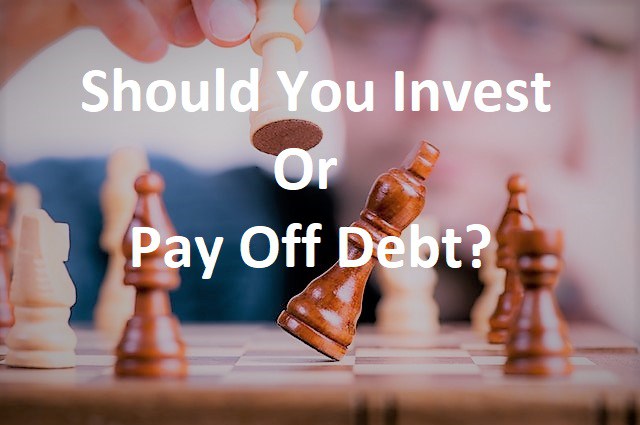I am in Debt, should I still invest ?

So you’re in debt. Maybe even a LOT of debt.
You know that you need to pay it off and that it should be your focus. But you also know that long-term wealth and financial independence is made through investing.
So what do you do? Should you invest when you’re in debt?
This is one of the most common questions we often get. It’s not surprising, either, with more and more people leaving University with a burdening student loan debt. Not to mention the increased cost of living with salaries that have remained stagnant and not gone up.
Before deciding whether you should focus on debt, investing, or both, you need to look at what sort of debt you are in. The reality is that not all debt is equal. Some debt has high, even crippling, interest rates. Other debt has rock-bottom interest rates.
The interest rate on your debt matters. Two good examples that illustrate this are credit card debt and mortgage debt.
Credit Card Debt
Credit card debt almost always comes with a high interest rate. Only in rare situations do people have what could be called a “low” interest rate on their credit card debt. The interest rate can exceed 20% on credit card debt. Because the required minimum payments are so low, it’s easy to stay in credit card debt for a long period of time. The credit card company isn’t going to make the difficult choices for you by giving you a high minimum payment – you have to take the initiative and pay it off.
High interest credit card debt should always be prioritized over investing. To justify investing while you are in debt you have to theoretically be able to make more gains on your investment than you pay in interest. Even if you refinance your credit card debt you could be looking at a 12% or 15% rate. While this is much better than 20%, you still should prioritize paying off this debt over investing.
Mortgage Debt
Mortgage debt, at least the past twenty or so years, has been low interest. I don’t pay a dime extra on my mortgage for a simple reason: instead of paying more towards my mortgage I can invest it in the Peer to Peer Investing market and get a better return.
To justify investing in the P2P market over paying more towards my mortgage I simply need to look at historical P2P market returns. On average the market will return 8%, based on historical data. Some use 10% or 7%, but if we are talking long-term investing 8% is a safe, conservative number to use.
Now think about my thirty year mortgage at 5.52%. Paying extra towards the mortgage instead of investing would actually cost me a lot of money long-term. I proved this in a spreadsheet that you can use as well to run the numbers.
From a pure math and logic perspective, it makes sense to invest instead of paying more of your mortgage.
What about Student Loans?
Student loans are a bit trickier as interest rates can vary greatly, especially when you start comparing public and private student loans. With that being said, many student loans are around 30%. If your student loans are 30% or lower, you should consider paying the minimum and putting the difference in the P2P Investing market.
I specifically addressed paying down student loan vs investing in this post. If you focus purely on the math and think of your financials as a math/paper exercise, you should be looking to make the best use of your money. With most student loans that means not paying more than the minimum, and instead investing any extra money.
And if you do have higher interest student loans you can typically Knock the interest rate down through a company like My Lending Angel.
Psychology Matters
We can run all the math exercises in the world, but I realize psychology matters. Some of us will be so affected psychologically by debt that even if their debt is at 3% they simply feel the need to get rid of it entirely, as quickly as possible.
I’ve become much more empathetic towards this opinion the past few years. I’ve seen the benefits of “interest rate arbitrage” where investing and paying the minimum on debt can pay off in better financials on paper, but I have also seen the psychological benefits that come with being debt free.
With that being said I would encourage people to weigh the pros and cons of investing versus paying off debt. In some cases, like high interest debt, it’s a no-brainer that getting rid of the debt as quickly as possible is the right choice. In other situations, like student loan debt, it can be a gray area. At the end of the day the choice is up to you.
Don’t Forget about an Emergency Fund
One thing I haven’t mentioned yet is how an emergency fund comes into play. I’ve seen people dig themselves out of debt just to find themselves back in credit card debt. How does this happen and how can it be prevented?
The answer is simple: an emergency fund.
If you don’t have an emergency fund I encourage you to first establish a small fund, even just $10,000 or $100,000, for unexpected expenses. Then focus on high interest debt, like credit cards. Before paying off other debt, you’ll want to build a one to three-month emergency fund to avoid having to go into debt when unexpected expenses arise.
Many people are looking for an answer to whether they should or shouldn’t invest while in debt, but others have strong opinions one way or another. What are your thoughts?